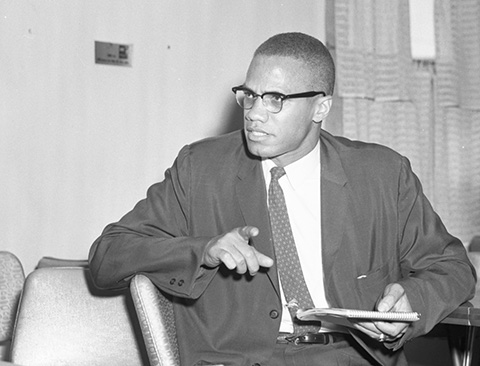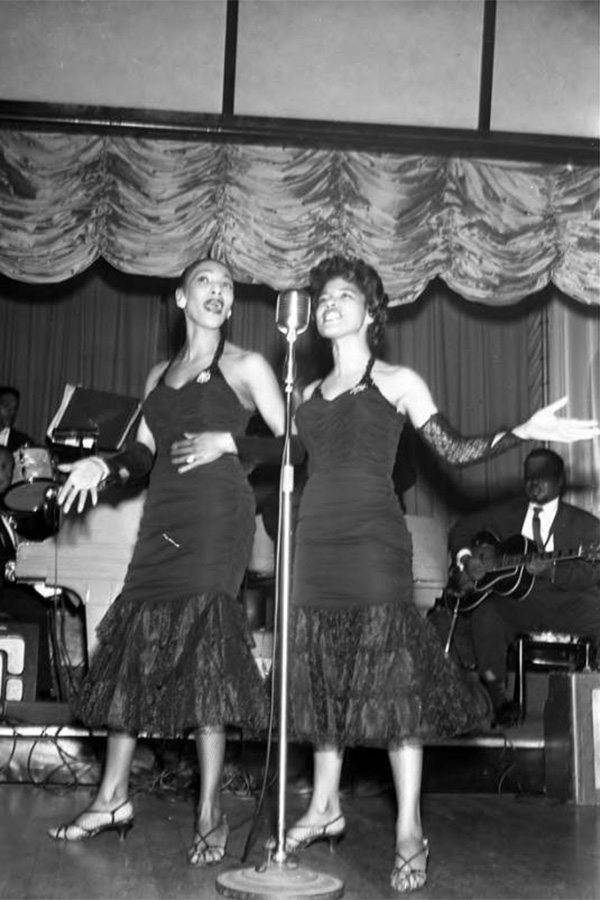Newsletter Edition: Spring 2025
By Sherwin “Keith” Rice, Ph.D.
In May of 1963, Malcolm X (later El-Hajj Malik el-Shabazz) graciously sat down to be interviewed by Fred Hardon in the back room of his family’s home on Dalton Avenue in Los Angeles. In honor of the centennial of Malcolm X’s birth (May 19, 1925), the Tom & Ethel Bradley Center would like to announce that Mr. Hardon has donated the audio and copyright to CSUN’s Bradley Center/University Library. Malcolm X’s daughter, Dr. Ilyasah Shabazz represented the Shabazz family in their support of the donation of Mr. Hardon’s recording to CSUN.
I cannot describe how the Bradley Center acquired the interview with Malcolm X without talking about my good friend Gwen Green. The late Gwen Green, whose centennial I also honor (April 22, 1925), is one of those unsung heroes of the civil rights movement that the public does not really know about because she loved working in the background. I met Gwen when she called the Bradley Center in 2013, after reading a Los Angeles Times article on the Bradley Center receiving a National Endowment for the Humanities (NEH) grant. The Bradley Center’s mission is to document and preserve the photographic and audio/visual history of overlooked communities in or linked to Southern California, whose history is often ignored and/or deleted.

The grant was awarded to us to digitize 18,000 images from three Los Angeles based African American photographers. Gwen told us she was affiliated with Dr. Martin Luther King Jr., and she offered to help us with the project. We were a little skeptical at first because we, at the Bradley Center, had never heard of her. However, we soon found out she was the real deal. Gwen helped us identify people in the photographs we digitized including herself with the likes of Bayard Rustin and local Urban League President John Mack. She became a dear friend to everyone at the Bradley Center, and especially me.
During our conversations Gwen would always tell me about her friend Freddie who had a tape of an interview he conducted with Malcolm X in 1963 that she wanted the Bradley Center to have. Fred Hardon lives in New York but spends several months out of the year in Los Angeles. On August 3, 2018, Gwen and I went to Mr. Hardon’s family home, which he still owns, to get the original reel-to-reel tape of the interview to digitize it. I recorded the conversation I had with Gwen and Fred in which we discussed how the interview came about. This informal interview was conducted in the same room on Dalton Avenue where Malcolm’s interview took place. Due to the passage of some 55 years, Gwen Green and Fred Hardon’s specific recollections of the first night Malcolm X visited his family’s home sometimes differed. Nevertheless, their memories made clear that Malcolm X did visit the Hardon home.
Hardon met Malcolm X the night before he conducted the interview when his family hosted a reception for their cousin, author and journalist Louis Lomax, following one of his speaking engagements. Louis Lomax and Mike Wallace introduced America to the Nation of Islam and Malcolm X in 1959, in their documentary The Hate That Hate Produced. In 1962, Lomax published his controversial book, The Negro Revolt. Unbeknownst to the Hardon family, Fred’s politically and socially active sister Nira Hardon and Gwen Green had invited Malcolm X to the reception. Gwen laughingly remembered opening the door when Malcolm X arrived and not knowing what to call him, greeted him by saying, Hello Mr. X.”[i] Many of the people attending the reception for Lomax were of a certain class or as Gwen stated, sedity [sic],[ii] which means snobbish, to the point one woman even screamed when she saw Malcolm X, quietly seated in a chair. On seeing Malcolm X, Mr. Hardon, Nira and Fred’s father asked, “What in the hell is he doing here?” And then Nira came and calmed him down.[iii]
In 1963, Malcom X was not the beloved human rights activist he is remembered for today because he challenged the status quo of the white dominant society. Many Black folks were afraid of Malcolm X and the Nation of Islam.[iv] Malcolm X did not scare everyone. Many people knew Malcolm spoke the truth. And they were represented in the Hardon household that night. After some of the people who attended the reception for Louis Lomax left, a large group of people stayed to speak with Malcolm X in conversations that lasted for half the night. According to Gwen. UCLA research economist Paul Bullock and his wife Connie, a Jewish couple were thrilled to be anywhere near Malcolm X.[v]
Before Malcolm X left Fred made his pitch, “Oh, I didn't talk to him, except I met him, and when he was getting ready to leave, I got up my nerve to tell him, Mr. X, I have a radio show I broadcast every week, and I would love it if I could interview you and play it on my radio show.” And he said, “Come see me at the mosque tomorrow afternoon.” That's the only thing I had to say to him. That next day, I went to the mosque, man, you're talking about cloak and dagger. You walk through that place. It's like candlelight and incense and low lights. I had to walk all the way through to the back. And he was in the back room sitting at a table with a low lamp on it. And then I explained to him that the show was, you know, it was like public service. You know, every radio station has devoted certain amount of time to public service. So, he heard me, and he said, “I'll be at your house at midnight.”[vi] On that night in May 1963, at the home of Fred Hardon’s parents on Dalton Avenue, in the West Adams District of Los Angeles, Malcolm X discussed several topics.
The interview topics include the idea of Black people having equal rights in a white-controlled society. Malcolm X argues that true equality is impossible in such a society and advocates for either returning to Africa or establishing a separate territory within the U.S. for Black people to be independent. Malcolm X criticizes Martin Luther King Jr.'s approach, arguing that it disarms Black people by teaching them to love their oppressors and seek integration without first securing economic stability. Malcolm X also expresses the importance of human rights over civil rights. Malcolm X also discusses the trial stemming from Los Angeles Police Department (LAPD) officers’ shooting of several members of the Nation of Islam and murder of Ronald Stokes on April 27, 1962. Malcolm X highlights the lack of media coverage and the trial’s significance as a case of police brutality and injustice against Black people.
The Bradley Center began as a repository for underserved communities in and connected to Southern California. However, in the last ten years the Bradley Center has created and acquired audio/visual documents that gives voices to that visual history. Having the audio recording of Malcolm X speaking to Fred Hardon during the turbulent year of 1963 about racial issues of that time gives a prominent primary source voice to many of the images archived in the Bradley Center.
This recording is a historical document of a one-on-one interview with Malcom X (formerly Malcolm Little, and later El-Hajj Malik el-Shabazz), one of the most influential members of the battle for human rights and racial equality during the twentieth century. Malcolm X serves as a remarkable example of the growth, transition, and evolution of many historical figures. The recording offers not only students but also faculty, staff, and the community access to Malcolm X during one short period of his evolution, out of the limelight, speaking with a young Black man in Los Angeles. To the best of my knowledge, no other such recording exists. This is a valuable resource for faculty members teaching classes in History, Africana Studies, Literature, Journalism, and English to advance their student’s knowledge of the significance of Los Angeles’s contribution to the Black freedom struggle during the 1960s.
[i] Gwen Green, interview by Keith Rice, August 3, 2018.
[ii] Gwen Green, interview by Keith Rice, August 3, 2018.
[iii] Gwen Green, interview by Keith Rice, August 3, 2018.
[iv] Gwen Green, interview by Keith Rice, August 3, 2018.
[v] Gwen Green and Fred Hardon, interview by Keith Rice, August 3, 2018.
[vi] Fred Hardon, interview by Keith Rice, August 3, 2018.

